Thirsty Classics is a nine-week miniseries celebrating lesbian cinema from before 1980. We often talk about these films like homework or mere stepping stones, but Drew is here to share how they can be fun… if you’re horny enough. This week: Leontine Sagan’s Mädchen in Uniform starring Dorothea Wieck and Hertha Thiele.
When my Hebrew school showed us Schindler’s List they skipped past the sex scene so we wouldn’t see nipples.
The decision to show this film at all, with its goy protagonist, horrifying violence, and maudlin Jewish characters, was proof that the Nazis had won.
I’d already seen the film and was not impressed. Like many closeted Jews/future theatre kids, my favorite Holocaust movie with a goy protagonist was Cabaret. Unlike Spielberg’s stodgy self-serious trauma porn, Cabaret was a celebration. This is what we had. This is what we lost. It emphasized that the Nazis didn’t just murder people. They murdered ideas. They murdered freedom.
But, as we know, their victory was not complete.
Pre-WW II German film is filled with a queerness and sexuality that reflects the culture of the Weimar Republic. Ernst Lubitsch’s early silent film I Don’t Want to be a Man (1918) was all about a “woman” dressing as a man and flirting her way across town. Richard Oswald’s Different from Others (1919) was explicitly about a gay male romance and was co-written by Magnus Hirschfeld, a prominent queer advocate and pioneer of transgender medicine. And then, of course, there was Marlene Dietrich.
As this era approached its tragic end, one last remarkable work of queer cinema was produced. Less than two years before Hitler was sworn in as chancellor, and one year after the setting of Cabaret, we were given the first film to ever explicitly be about queer women.
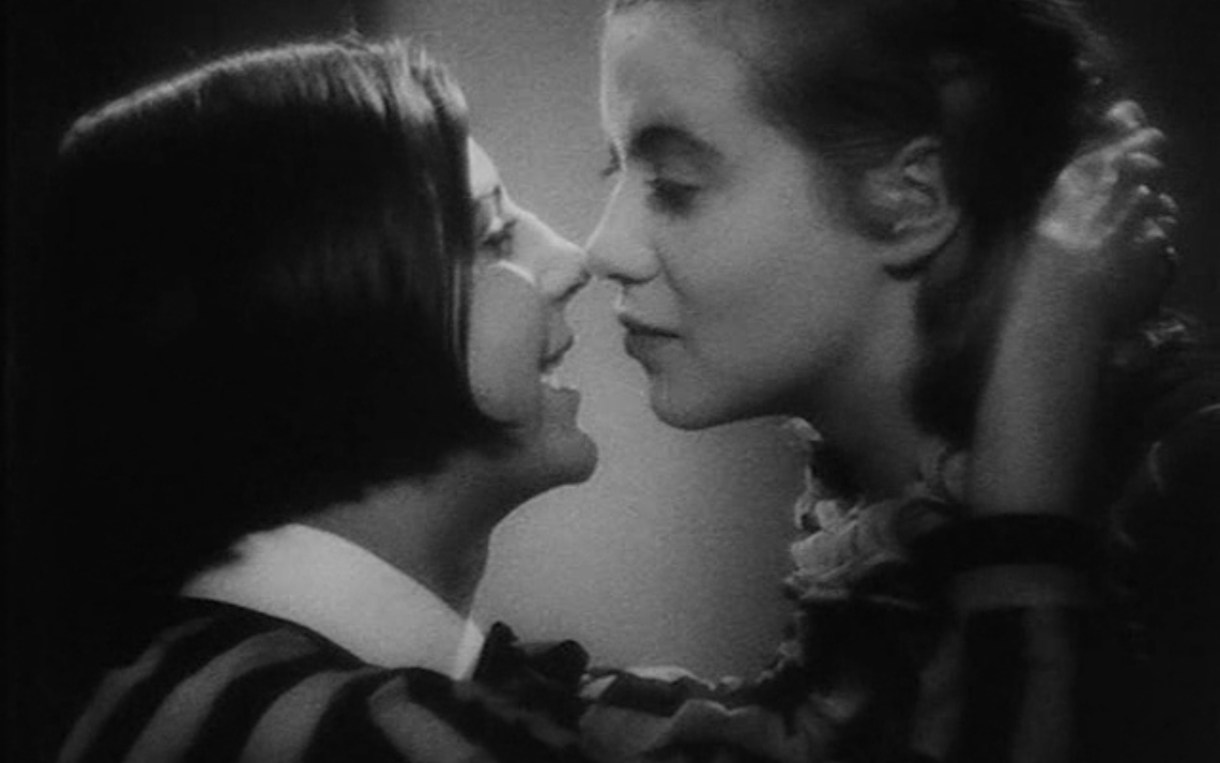
“Oh, yes, it’s true. We’re living in delicious sin.”
Leontine Sagan’s Mädchen in Uniform is not only the first lesbian film. It also completely shaped the culture around lesbian cinema. So many of the things we now call tropes, began with this horny masterpiece.
After an opening montage of homoerotic sculptures and boarding school girls marching like soldiers, we meet Manuela, our protagonist. Manuela is fourteen (fourteen and a half, she clarifies) and new to the school. Her mother has died and her aunt has grown tired of the girl she describes as “overly sensitive and a bit of a scatterbrain.”
She meets the other girls and is immediately informed how lucky she is to be in Fräulein von Bernburg’s dorm. “All the girls have a crush on Fräulein von Bernburg,” says Ilse, the troublemaker of the bunch. “One minute she looks at you terribly. Then, all of a sudden, she’s very kind,” she continues, describing most of my crushes between the ages of 4 and 25, my current age.
As Ilse says this to Manuela she leans in close, flirting by proxy. Manuela tries to ignore this information, but Ilse continues, finding any excuse she can to touch her. She’s bursting with confidence, humor, and all-consuming adolescent horniness.
And then we meet Fräulein von Bernburg. Manuela runs into her in the hall and von Bernburg grabs her wrists. She tells Manuela that she must be obedient. Her word choice and tone sound less like a concerned teacher and more like a BDSM scene.
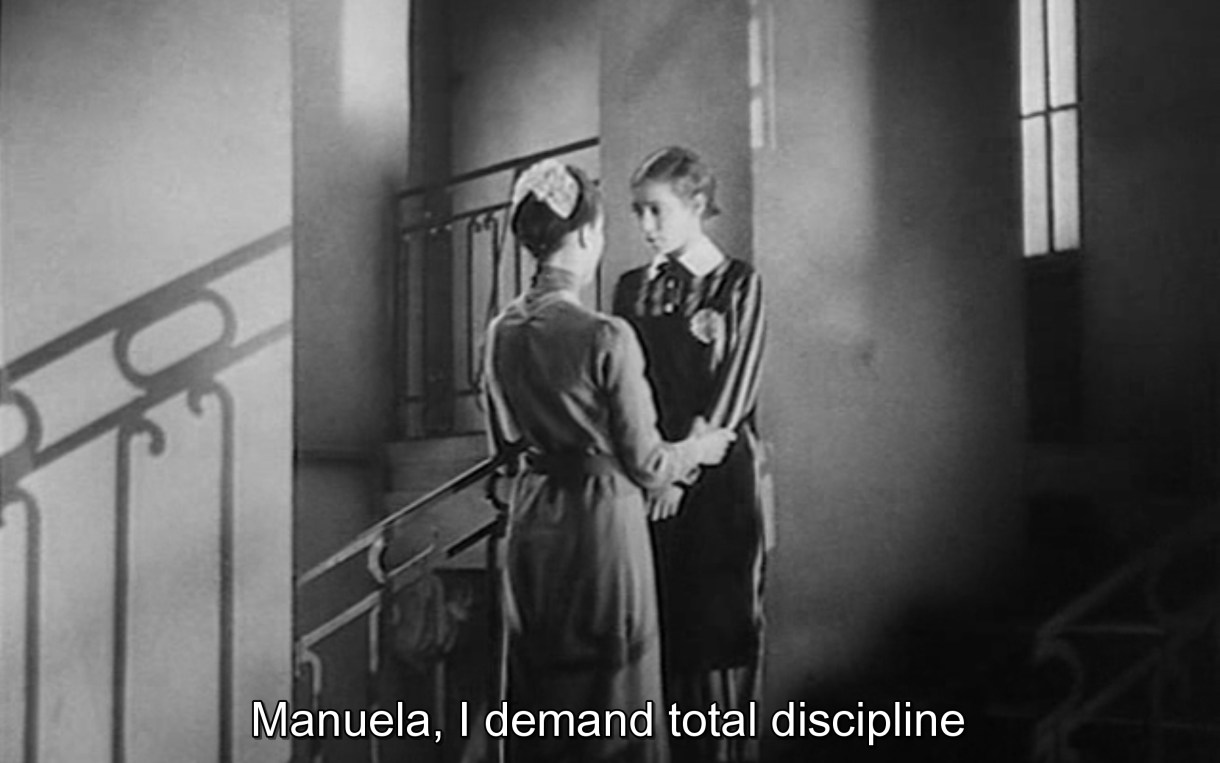
Yes, Fräulein.
Manuela is played by Hertha Thiele who was 23 at the time of shooting. Ellen Schwanneke who played Ilse was 25. Some of the other girls were played by actual teenagers, but most were not. The suggestion that these grown women are fourteen implies this is what teenagers look like. And since the film overtly sexualizes them, and wants us to do the same, this suggestion is dangerous. Even though no relationships are ever consummated, it’s worth pausing to acknowledge this entire premise is less than ideal. Especially because it’s so influential.
Like many adult queers, I love coming-of-age movies because they provide an upbringing I never had. I didn’t come out until I was 23, so my lesbian adolescence was confined to make outs with other closeted queers. It’s unsurprising that watching queer teenagers fall in love and actually get to be in love warms my heart.
But when it comes to sexuality, where’s the line between wish fulfillment and lusting after teenagers? Are these movies simply role play? Does it matter how the characters are presented and their relationships are framed?
While a film like Jacqueline Audry’s Olivia directly engages with the reality of a student/teacher relationship, Mädchen in Uniform leans deep into the fantasy. If you can’t get past this, I understand, but I think one of the reasons the film still works is because of how deeply we’re placed within Manuela’s gaze. She is not a sexual object. She’s a sexual being. And most of her sexuality is directed at Fräulein von Bernburg.
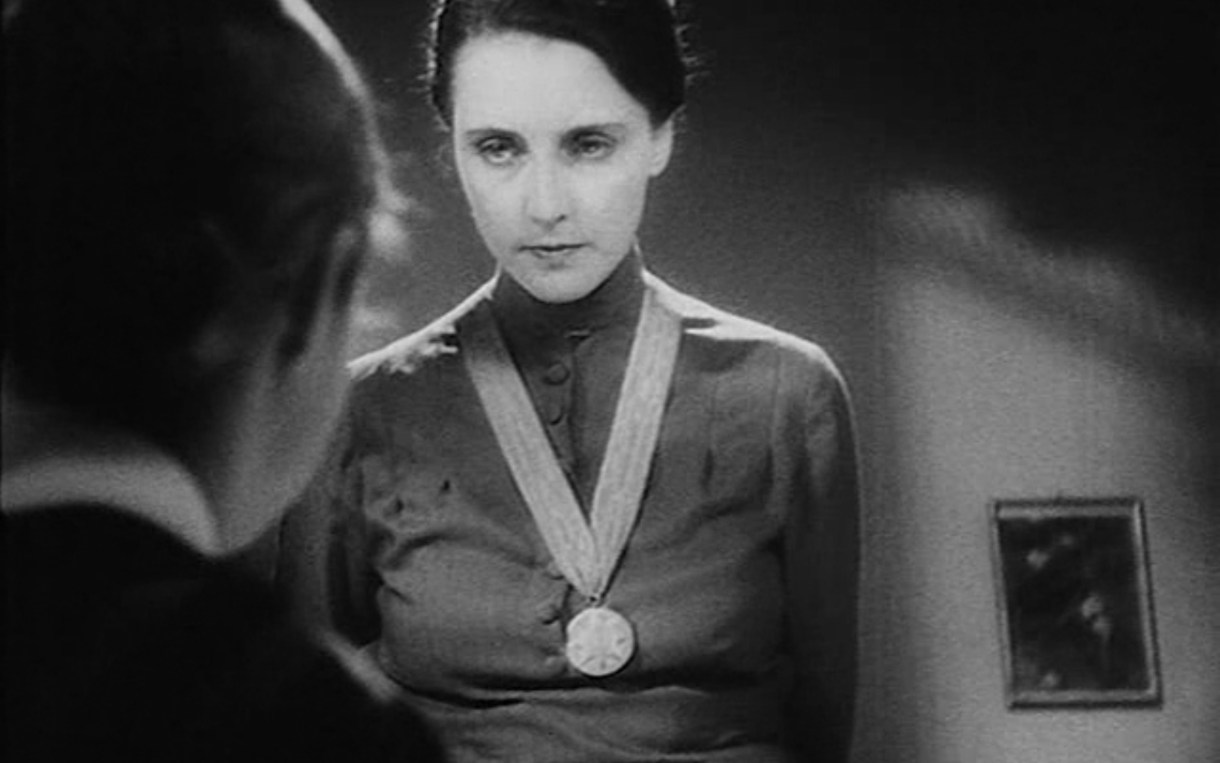
I assume this medal was won for achievements in the sapphic arts
Ilse excitedly informs Manuela that every night Fräulein von Bernburg kisses each of the girls goodnight. A peck on the forehead. Or, as Ilse puts it, “Gives each one a smacker! Wonderful.”
While she makes her way across the room, Ilse sits up perched and ready to go. Manuela is slightly more reserved. But when it’s finally her turn Manuela wraps her arms tightly around her teacher. Von Bernburg pulls her arms down, places her own hands on Manuela’s face, and kisses her softly on the lips.
Manuela falls back to bed with a grin so wide it’s falling off her face. I doubt she got much sleep that night. And I definitely know what she dreamed about.
The girls love Fräulein von Bernburg because she’s sometimes mean and sometimes nice and always hot, and, yes, kisses them every night. But the real reason they love her is because she’s tender in an environment that’s harsh.
During a staff meeting, von Bernburg says that she tries to be a friend to the students. The other teachers scold her for emotionalism. The rest of the staff is not only cruel in their words. The girls are also underfed, overworked, and unable to even own books. The headmistress says that the girls are daughters of soldiers, the future mothers of soldiers, and so they shouldn’t need… food.
That last declaration is shown in contrast with the girls, alone, fantasizing about what they most want to consume. One girl says coffee cake with a thick top. Another says an éclair, as she sensually describes the cream. These are girls who desire. They’re teenagers and they have big wants and big needs. They constantly have their hands on each other and they even write love notes back and forth. Von Bernburg intercepts one of these notes and destroys it without comment or punishment. She understands their feelings are normal.
Madchen in Uniform is ultimately about oppression. The oppression of sexuality, of all forms of pleasure. The headmistress has created a school run on fascism and Fräulein von Bernburg has dared to suggest there’s another way.
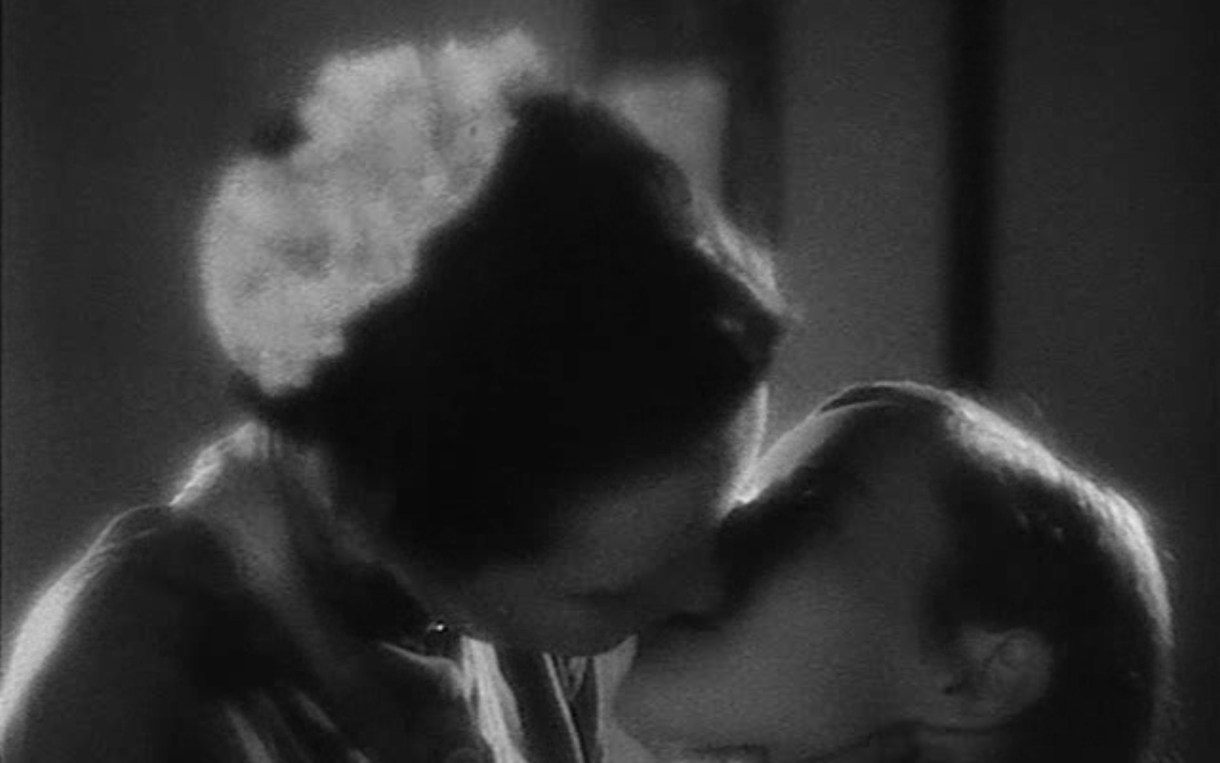
Fighting fascism one inappropriate kiss at a time
The lines between understanding teacher and grown woman in love with her student continue to blur as Manuela’s crush becomes more explicit.
Von Bernburg finds out that Manuela cries herself to sleep every night and she calls her in for a chat. She asks her if she’s homesick.
“Homesick?” Manuela replies. “No. I just feel like crying sometimes.” If that’s not a big gay mood I don’t know what is.
Von Bernburg continues to push. When Manuela says that her feelings are too hard to explain, von Bernburg says, “Well, try. I’d really like to know.” She’s so warm in these moments. When placed in contrast with the rest of the school it’s overwhelming. She’s every parent, every mentor, every sexual fantasy. She makes you feel like everything just might be okay.
Manuela opens up.
“When you say goodnight and leave, and shut the door to your room, I stare at the door in the darkness. I want to get up and come to you, but I know that I can’t. And I think when I get older and have to leave the school and every night you will kiss other girls.”
“What thoughts you have,” von Bernburg says trying to minimize this declaration. But Manuela is ready with an even clearer one. “I love you so much!” she shouts frantically.
The gay feelings finally become too much for Manuela when she stars in the school production of Schiller’s Don Carlos. Yes, she is both “dressed as a man” and wearing tights. Yes, she has multiple romantic scenes with another girl.
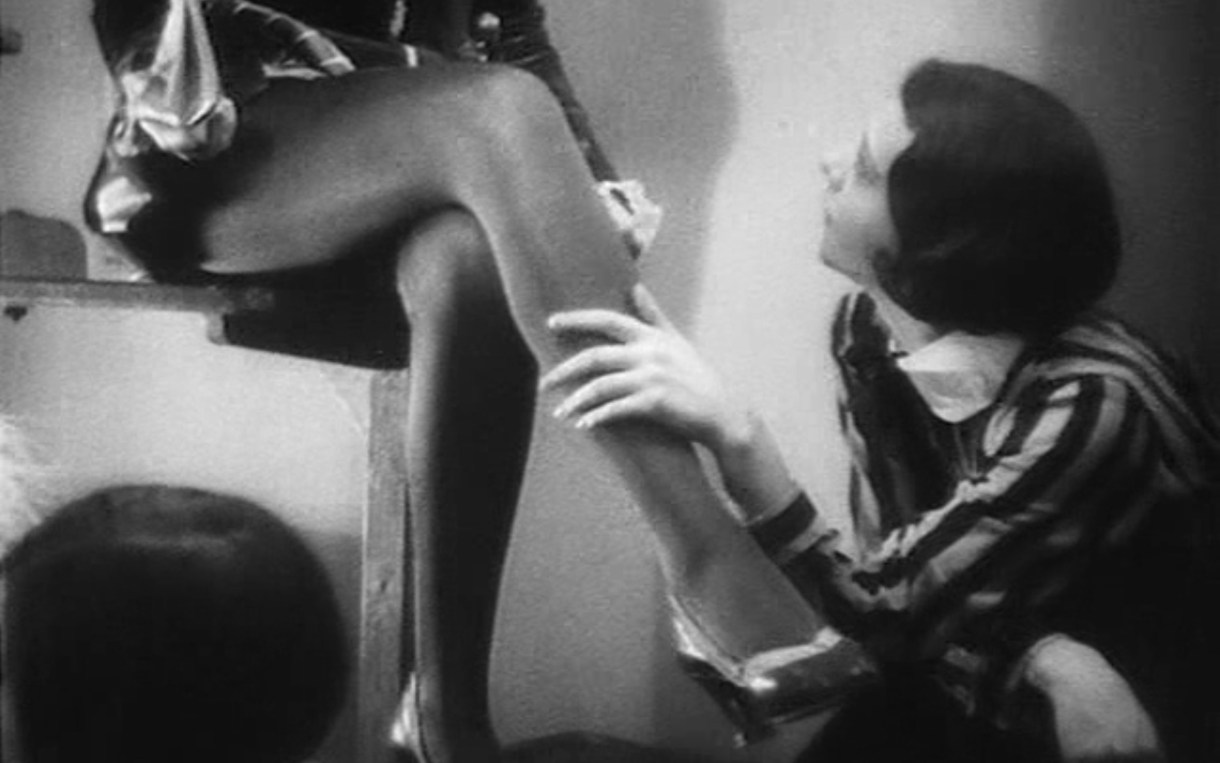
Theatre kids are objectively the horniest
Afterwards, Ilse comes up to Manuela praising her performance. They lean their faces close together. It’s obvious they should let go of their teacher and crush on each other instead. But they’re not ready for that reality. So Ilse says that von Bernburg was watching closely the whole time.
Manuela finds her teacher and she confirms this to be true. She tells Manuela that she could be a great actress if she wanted to be. These two scenes confirm that Manuela’s crush is more than misguided. She’s so much more comfortable and real with Ilse. But who among us crushed on the right person as a teen.
Soon this will all explode.
The girls are given celebratory punch at the after party and Manuela drinks more than her fill. Before she or anyone else knows it, she’s standing in front of everyone declaring her love for Fräulein von Bernburg. The headmistress hears and confronts her. But Manuela commits. “Yes everyone should know!” she shouts before passing out.
After this episode, the headmistress bans Manuela from seeing von Bernburg. Knowing the alternative is expulsion, the teacher tries to comply. She tells Manuela, “You must be cured whatever it takes.” Manuela looks at her with pained longing. “Cured? Of what?”
Like so many works of lesbian cinema, Mädchen ends in suicide. Unlike so many works of lesbian cinema that suicide is not successful. The film spares Manuela that fate and spares itself an easy dramatic choice. Instead Manuela is pulled off the ledge by her peers and they all confront the headmistress with their stares. In solidarity, they side with Manuela, they side with Fräulein von Bernburg. They declare that this school is a safe place to be a gay. They declare that this school is a safe place to have feelings.
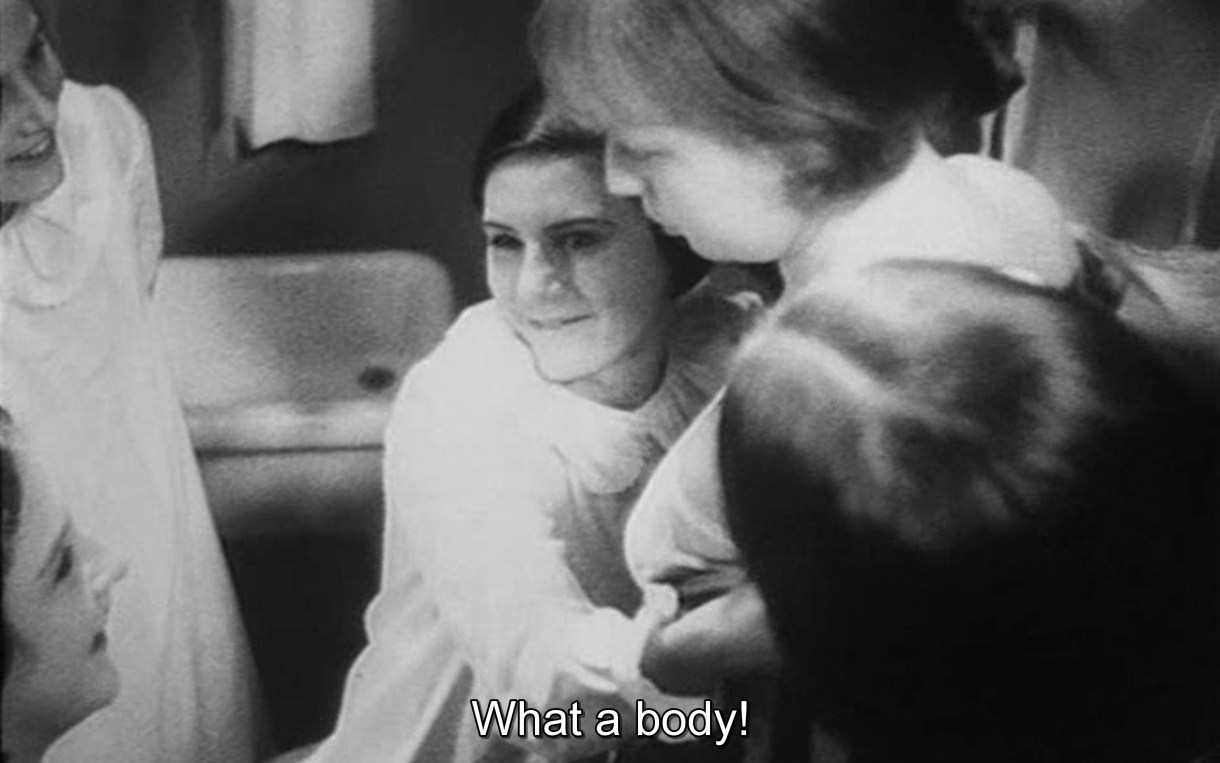
Gay feelings!
Mädchen in Uniform cannot be separated from when it was made. It’s an explicitly anti-fascist work made in a time when fascism seemed inevitable. It was made in a place where queerness was accepted, but on the brink of being erased.
Yes, this movie was the first (that we know). Yes, with its boarding school setting, its central age difference, and its near-suicide ending the movie can be credited with inspiring works such as But I’m a Cheerleader, Carol, The Children’s Hour, All I Wanna Do, The Miseducation of Cameron Post, very explicitly, Lost & Delirious, Loving Annabel, and Olivia, and to some extent just about every lesbian movie ever.
But its importance goes beyond its novelty and its influence. Revisiting a proudly queer movie from 1931 Germany is a reminder that our current era of queer acceptance is not the first, nor is it necessarily permanent. The existence of this film is a reminder of what was lost, not just in Germany in the 30s, but repeatedly throughout history as Christian white supremacist patriarchy attempted to erase cultures with more fluidity around sex and gender.
What I’m saying is thirsting over classic movies is an inherently political act. Remembering that queer people have always been here, and have always been hot, is a necessity if we want our present and future to be truly queer. It’s important that we continue to watch the works that are available, and continue to uncover the queer films from all around the world that are unavailable.
Know your history. Know our history. And, in the process, I hope you cum.



Ahhhh, I think I watched this movie in college and now I need to watch it again. Thank you for writing this!
I’m not especially attracted to women in uniform….
but I look good in a uniform. Just saying.
I like your parallels with Cabaret about celebrating lost culture and fighting back against surging fascism. Good thing the Hays code didn’t apply here.
Excellent piece, thank you!
I was hoping you’d do this one! I dream of a day when this film gets the proper acclaim and restoration it deserves so I can watch it on something other than youtube.
Also worth watching if you can find it is Anna and Elizabeth, also starring Thiele and Wieck. If I remember correctly, it’s not as explicitly queer, but I did enjoy seeing the two actresses work together again.
I know! It’s absurd that it hasn’t had a proper restoration.
I haven’t been able to find Anna and Elizabeth with subtitles… but hopefully someday…
I think the copy of Anna and Elizabeth I watched on youtube was only partially subtitled. :/ Better than nothing, I guess!
thanks for introducing us to the movie!
not sure, though, if its an anti-facism piece. the school sounds like it’s criticizing the prussian educational model, not german fascism. Also, a quick check on wikipedia (german-language pages – more detailed than the english ones) turns out: Almost everybody involved in the movie continued to pursue their careers during Nazi times. Wieck, who plays von Bernburg, the teacher, was a huge star then and shared a table with Hitler several times.
wikipedia says it’s autobiographic, written by christa winsloe on her experiences in a prussian boarding school for daughters of the prussian aristocracy and military in 1903. winsloe left germany for long periods of time when the nazis took over, but doesn’t seem to have been overtly political or blacklisted – she was trying to get a visa to pass through nazi germany in the 1940s (she was by then a hungarian citizen) but ended up killed in southern france by some thugs.
Interesting! It definitely is explicitly criticizing the Prussian educational model, but due to the time it was made it felt metaphorical.
Do you have any knowledge of Leontine Sagan’s politics during the time?
The novel by Winsloe is slightly different in tone. It emphasises the Prussian cruelty themes, and starts before she gets to the school.
An English version was published by Virago Press in the 1990s: https://www.amazon.de/Child-Manuela-Madchen-Uniform-Landmarks/dp/1853817457
Amazon also lists French and Spanish versions.
Here is an English essay on the author: https://www.lesbengeschichte.de/Pdfs/pdfs_bio_skizzen_englisch/winsloe_schoppmann_engl.pdf
Hi,
I’ve been obsessed with the remake (1958) of this movie for most of my tweens. In fact this movie, the 1931 version, was lost despite being a hit in its heyday because (!) it was part of the Nazi book burnings in 1933, which meant to eradicate liberal art (“entartete Kunst”). I don’t know if it was as much a statement against rising fascism as it was against the rigidity of Prussian morality (the title “Girls in Uniform” alludes to it.) the Nazis were not happy with its message, and all German copies were lost.
It was only rereleased in 2003, when a copy was found in the attic of an old house in Brazil (!) it was remastered then, from that copy. I know these things because I tried to get my hands on a copy for years and went to the first or at least one of the first public screenings of this version (the 1931 one) of the film, which was at a small open air movie theater in Berlin. It was the first time, that my first gf and I went out as a couple with our friends and we were so nervous, we hardly dared hold hands, but were also so in love that we volunteered to get popcorn during the intermission, which resulted in some dancing to “Besame Mucho” which blared from the popcorn truck and then some making out.
The movie struck me, because I live and grew up in Berlin and it was so leveled during the war that during the introduction you see an entirely different city! There’s the city castle next to the statues of a bridge I used to commute by, but I’ve never seen that castle, the pyjamas are creepily reminiscent of darker times, the 1931 version really is very openly physical and this is not how I imagined Berlin and Germany at all! 1931!
I think that when people talk about Germany and fascism, they like to think about a nation of raving racist lunatics, but that was not the case. Hitler built streets, made events happen, eased poverty and unemployment and then started on discrimination little by little. Introduced madness bit by bit. Jews weren’t allowed to buy cake or soap at first, for example, which weird, right? But in the day to day not really something that would make people hit the streets in droves if people were denied toiletries? And then, and then..a lot of people kept quiet, a lot of them turned their heads from atrocities. The most horrendous ones were kept secret. And even if people knew, they pretended not to. Because how to deal with that knowledge?
This movie fits into a time slot that I personally thought would be a lot different, but it’s entirely not. It’s so gay and camp and full of a message against frugality and the corset of late Victorian principle that it is jarring, considering, that the opening sequence passes by the very street this movie would be literally lit up into flames underneath the open sky at. Two years later.
What if this movie is not about fascism at all? What if fascism wasn’t an issue? Wasn’t seen as a problem, big enough to reference in this very gay movie?
The NSDAP only entered the German parliament in 1930 and it did not gain power until 1933.
This movie falls right into the middle of this. Imagine the innocence of it.
Will people think the same of The Avengers one day?
It’s mind boggling.
Damn, thanks for laying all that out! And going to get the popcorn.
I’m actually not sure innocence is the word I’d use! Because I actually think a lot of art right now is responding to the current cultural moment either as it is or as we fear it will be.
I’m not sure about The Avengers (but maybe! it was written during the election and filmed during the first months of Trump’s presidency and the end of Infinity War is darker than anything else the MCU had done). But definitely in other work. So many TV shows have addressed Trump or Me Too in some way. And even something as banal as The Post (sorry I really can’t resist insulting Spielberg apparently) was clearly made in response to Trump despite its recent history setting.
I think artists are often doing what they can to respond to the moment even if it can feel futile in retrospect. I have no way of knowing if Leontine Sagan was explicitly trying to make something anti-Nazi, but I don’t think it’s a coincidence this story was first told when it was.
Not sure if I misunderstand you-
There were versions of Mädchen in existence. I watched them during the 1980s and 1990s. Wikipedia says that a public rescreening first happened in 1977 but copies were in circulation before that.
And fascism was recognised as a problem from 1930 onwards and before that. Remember that there was a failed coup in 1923. The NSDAP was forbidden several times before 1933. And the years between 1930 and 1933 were the so-called Kampfzeit, when there was constant violence. Also, Mussolini had risen to power earlier.
Hi, I was under the impression that only the 1958 Version was widely available during that time?
What I find so jarring is not that faschism and the NSDAP didn’t exist, when the movie was filmed, but that they weren’t seen as the world changing evil,all encompassing force that they turned out to be not two years later. I mean, how could they be not a central theme to this very queer movie, otherwise?
It’s like watching Cabaret, the aloofness, the drama, and then the sudden twist.
It‘s the timeline that’s getting to me.
What does it mean for our time, where Brexit came out of nowhere, and Trump and Poland has a nationalistic government, and sure, if you look back, you can see it coming, but I really didn’t! I talk about gay drama with my friends!
We dance one day, and crush on our teachers and the next it’s V for Vendetta.
Freedom is a thing that’s never won, never safe, and that is just really..jarring. Faschism and evil doesn’t announce itself, it’s just there one day and swallows everything whole.
It’s a weird discussion to be having about an old movie, but my country’s past has always been ubiquitously present and I keep wondering how I would have fared in that time, what kind of human being I would have been, and I still am wondering what kind of human being I am now.
i love these thirsty classics posts and this one was my favorite so far <3
Thank you, Kristen!!
“Theatre kids are objectively the horniest” DREW
FACTS
In between the politics I forgot to mention the way that Manuela describes her longing for something she cannot name is just such a THING! Ugh! I always felt so out of place and watching these old movies made me really go:”Whut?!”
The way I’ve been feeling isn’t new or extra or strange, we’ve been gay and queer and desiring and desirable forever.That was an important fact. It’s been putting me into the context of history, somehow.
I think Cracks (2009) was also inspired by this movie
I think I watched this movie in college and now I need to watch it again
http://gospelmusic2021.org/